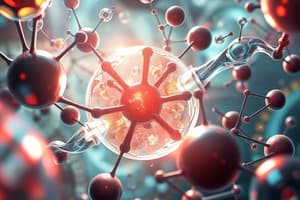Podcast
Questions and Answers
How does biochemistry describe life processes?
How does biochemistry describe life processes?
Biochemistry is a multidisciplinary field that asks questions about the molecular nature of life processes.
How did living things originate?
How did living things originate?
The fundamental biochemical similarities observed in all living organisms have engendered speculation about the origins of life.
Can a chemist make the molecules of life in a laboratory?
Can a chemist make the molecules of life in a laboratory?
Yes, it is possible but sometimes extremely difficult to make the molecules of life in a laboratory.
What makes biomolecules special?
What makes biomolecules special?
What are functional groups of importance in biochemistry?
What are functional groups of importance in biochemistry?
How and when did Earth come to be?
How and when did Earth come to be?
How were biomolecules likely to have formed on the early Earth?
How were biomolecules likely to have formed on the early Earth?
Which came first: the catalysts or the hereditary molecules?
Which came first: the catalysts or the hereditary molecules?
What is the difference between prokaryotes and eukaryotes?
What is the difference between prokaryotes and eukaryotes?
How is prokaryotic DNA organized without a nucleus?
How is prokaryotic DNA organized without a nucleus?
What are some other important components of cells?
What are some other important components of cells?
What is the source of energy in life processes?
What is the source of energy in life processes?
How do we measure changes in biochemistry?
How do we measure changes in biochemistry?
What kinds of energy changes take place in living cells?
What kinds of energy changes take place in living cells?
Flashcards are hidden until you start studying
Study Notes
Describing Life Processes
- Biochemistry explores the molecular aspects of life and intricate chemical reactions occurring in living cells simultaneously.
Origin of Life
- Fundamental biochemical similarities among organisms spark theories on the origins of life.
Lab-Made Life Molecules
- Molecules of life can be synthesized in labs, utilizing organic chemistry processes; however, challenges may arise in replicating natural structures.
Unique Biomolecules
- Biomolecules differ from standard organic molecules due to specific functional groups that play significant roles in biological systems.
Important Functional Groups
- Key functional groups in biochemistry include:
- Carbonyl groups
- Hydroxyl groups
- Carboxyl groups
- Amines
- Amides
- Esters
- Phosphoric acid derivatives such as esters and anhydrides.
Formation of Earth
- The Earth and solar system formed roughly 4 to 5 billion years ago from elements sourced from first-generation stars.
Early Biomolecule Formation
- Evidence suggests that important biomolecules can form under abiotic conditions from simple early Earth atmospheric compounds, enabling polymerization into protein-like structures.
Catalysts vs. Hereditary Molecules
- Cellular function hinges on catalysts and the genetic code; RNA may have historically served as both a catalyst and coding molecule.
Prokaryotes vs. Eukaryotes
- Prokaryotes lack internal membranes, while eukaryotes possess membrane-bound organelles with specified functions.
Prokaryotic DNA Organization
- Prokaryotic cells contain a nuclear region instead of a defined nucleus, housing DNA and paired with ribosomes for protein synthesis.
Additional Cell Components
- Eukaryotic cells feature other structures, including the Golgi apparatus, essential for protein secretion.
Energy Source in Life
- All cells need energy; the sun is the primary source. Photosynthetic organisms convert light energy into chemical energy in carbohydrates, which various organisms use.
Measuring Biochemical Changes
- Energy changes during biochemical processes can be measured to determine reaction likelihood. Reactions that release energy are favored, while energy-consuming ones are not.
Energy Changes in Living Cells
- Various forms of energy exist in cells, with thermodynamic principles governing their conversions and transformations.
Studying That Suits You
Use AI to generate personalized quizzes and flashcards to suit your learning preferences.




